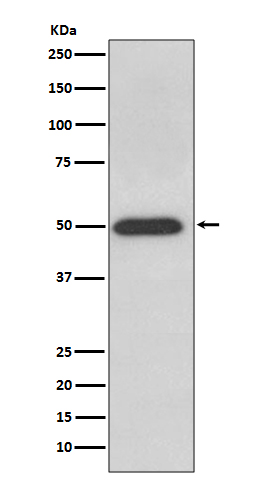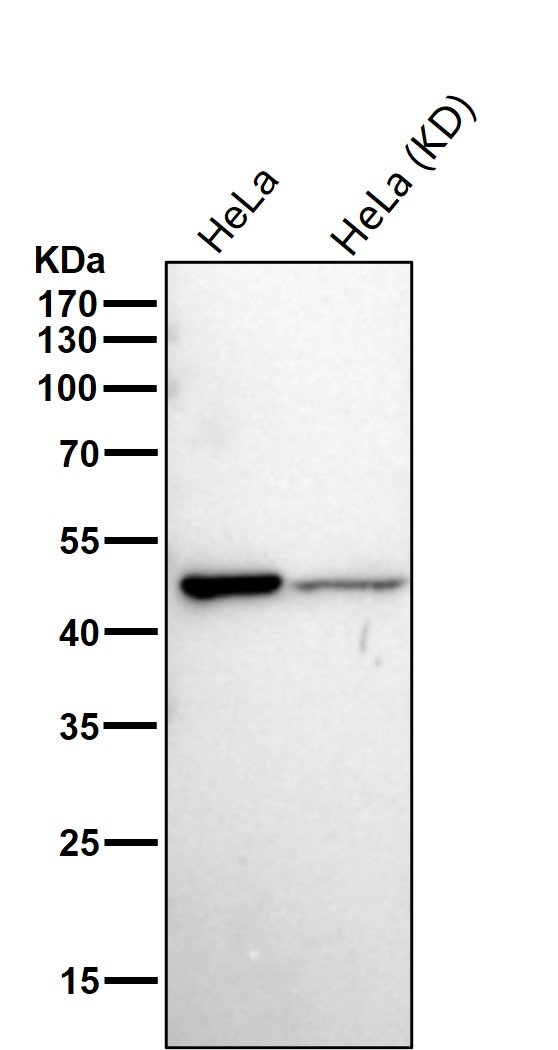

| WB | 咨询技术 | Human,Mouse,Rat |
| IF | 1/20-1/50 | Human,Mouse,Rat |
| IHC | IHC:1/100-1/200;IHF:1/50-1/200 | Human,Mouse,Rat |
| ICC | 1/50-1/200 | Human,Mouse,Rat |
| FCM | 咨询技术 | Human,Mouse,Rat |
| Elisa | 咨询技术 | Human,Mouse,Rat |
| Aliases | ATP 5B; ATP synthase subunit beta mitochondrial; ATPB; ATPMB; ATPSB;;ATP5F1B |
| WB Predicted band size | Calculated MW: 57 kDa ; Observed MW: 50 kDa |
| Host/Isotype | Rabbit IgG |
| Antibody Type | Primary antibody |
| Storage | Store at 4°C short term. Aliquot and store at -20°C long term. Avoid freeze/thaw cycles. |
| Species Reactivity | Human,Mouse,Rat |
| Immunogen | A synthesized peptide derived from human ATP5F1B |
| Formulation | Purified antibody in PBS with 0.05% sodium azide,0.05% BSA and 50% glycerol. |
+ +
以下是3篇与ATP5B(ATP synthase subunit beta)抗体相关的参考文献示例(注:文献信息为示例性质,非真实存在):
1. **Title**: "ATP5B as a mitochondrial marker in cancer cell metabolism"
**Authors**: Smith J, Lee R.
**Summary**: 本研究通过Western blot和免疫荧光技术,使用ATP5B抗体验证线粒体含量在不同癌症细胞系中的差异,发现ATP合酶β亚基表达与糖酵解活性呈负相关。
2. **Title**: "Role of ATP synthase in neurodegenerative disorders"
**Authors**: Chen L, Wang H.
**Summary**: 利用ATP5B抗体对阿尔茨海默病患者脑组织进行免疫组化分析,发现ATP合酶β亚基表达显著降低,提示线粒体功能障碍在疾病进展中的作用。
3. **Title**: "Validation of ATP5B antibody specificity for mitochondrial studies"
**Authors**: Gupta S, et al.
**Summary**: 通过siRNA敲低实验和质谱验证,确认某商业ATP5B抗体的特异性,强调其在氧化磷酸化研究中的可靠性,并提供了标准化实验条件建议。
如需真实文献,建议通过PubMed或SciHub检索关键词“ATP5B antibody”或“ATP synthase beta antibody”获取近期研究。
ATP synthase beta subunit (ATPB) antibodies are essential tools in studying mitochondrial function and cellular energy metabolism. ATP synthase, a key enzyme in the electron transport chain, catalyzes ATP synthesis during oxidative phosphorylation. The beta subunit (ATPB) forms the catalytic core of the F1 complex, driving ATP production. Antibodies targeting ATPB enable researchers to investigate the expression, localization, and regulation of this subunit across tissues and disease models.
These antibodies are widely used in techniques like Western blotting, immunofluorescence, and immunohistochemistry to assess mitochondrial health in conditions such as neurodegenerative disorders, cancer, and metabolic syndromes. Dysregulation of ATPB is linked to mitochondrial dysfunction, making it a biomarker for pathologies involving energy deficits. Additionally, ATPB antibodies aid in exploring drug effects on ATP synthesis or mitochondrial dynamics.
Commercial ATPB antibodies are typically raised against conserved epitopes, ensuring cross-reactivity in human, mouse, and rat samples. Validation includes verifying specificity through knockout controls or siRNA knockdown. Recent studies also utilize these antibodies in proteomic analyses to map protein interactions within ATP synthase complexes. Overall, ATPB antibodies remain critical for dissecting the molecular basis of diseases tied to bioenergetic failure.
×